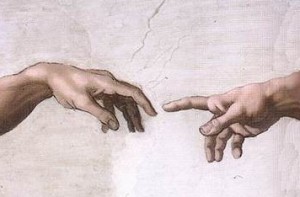Which is Real: Science or God?
 I’ve wondered, since my conversion, why some found it so much harder to believe in God than in Science. When I was younger in college, I took the pronouncements of my teachers–Nobel Prize winners* and graduate students–as holy writ (although I didn’t know then what holy writ was). In laboratories we repeated famous experiments, Galileo’s inclined plane, Millikan’s charge/mass ratio, Morgan’s experiments with fruit flies (what a headache from the ether, picking out anesthetized flies), etc…
I’ve wondered, since my conversion, why some found it so much harder to believe in God than in Science. When I was younger in college, I took the pronouncements of my teachers–Nobel Prize winners* and graduate students–as holy writ (although I didn’t know then what holy writ was). In laboratories we repeated famous experiments, Galileo’s inclined plane, Millikan’s charge/mass ratio, Morgan’s experiments with fruit flies (what a headache from the ether, picking out anesthetized flies), etc…
As physics and chemistry became more sophisticated–quantum mechanics and electrodynamics–the experiments, the thesis work verified H psi = E psi, Maxwell’s equations, and the Second Law. But very few atheists and agnostics–journalists and politicians for the most part–have had this experience. Nevertheless, they believe what “scientists” tell them about the world as an article of faith, not justified by what they themselves have done or perceived.
It was only until after retirement that I started looking into the philosophical foundations of science and its various disciplines that I realized that there is a contingent of philosophers–“anti-realists”, “constructivists”, “empiricists”–who question whether there is a reality that lies behind science. Their arguments make sense, but more of that in a later article.
I assert that the vast majority of people put a faith in science that is much less justified than a faith in God. In a previous article (Top Down to Jesus) I’ve argued that a rational, historical approach will justify a faith in the Resurrection and in the Divinity of Our Lord. Moreover, the subjective experiences we ourselves have had and that have been related to us, the tested accounts of miracles, are as good evidence for the existence of God as are accounts of scattering experiments for the existence of the Higgs boson.
The best account of the uncritical atheistic foundational belief system has been given in a excellent review by Michael Potemra (see NRO, “The Corner”, April 28,2012) of a book by a noted paleontologist, Michael Asher: Evolution and Belief: Confessions of a Religious Paleontologist. I can add very little to Potemra’s review, but I would like to repeat his quote from the book, because it expresses my attitude about science and religion to a T:
“The absence of a scientific proof for God is more indicative of the limits of science than the lack of a deity (emphasis added)…Evolutionary biology is not about the origin of life or the existence of God. It is about how living things are interconnected through a specific, natural mechanism, one which we can understand through the fossil record, individual development, and molecular biology.” Asher
and
“it is rational to believe that an entity beyond our comprehension was the agency by which something was derived from nothing at the beginning of time…Although I acknowledge my belief to be non-scientific, it is entirely rational. Science is a subset of rationality; the former has a narrower scope than the latter. To ignore rationality when it does fall beyond the scientific enterprise would be an injustice to both reason and humanity.” Michael Asher
Most people aren’t aware of the distinction between science and other rational enterprises–science requires theory (usually mathematical and linked to other theories, more basic and fundamental), confirmed or falsified by observation/reproducible experiment.
Because faith in God is not quantifiable, the atheists classify it as one of the White Queen’s “Six impossible things before breakfast”. That’s hokum! Many rational beliefs cannot be assessed numerically.
It is science itself that is limited in that science, in its best and purest practice, is restricted to those tests that can be verified by quantitative measurements. It is faith in God that is most easily tested by the person, in his own experience and by historical evidence.
*The graduate students were usually better teachers if not always as spectacular as the the Nobel Prize winners: Pauling, Delbruck, Feynman, Schwinger, Purcell, Van Vleck

